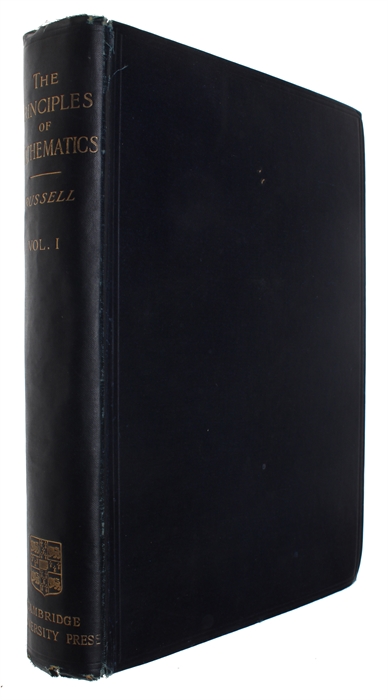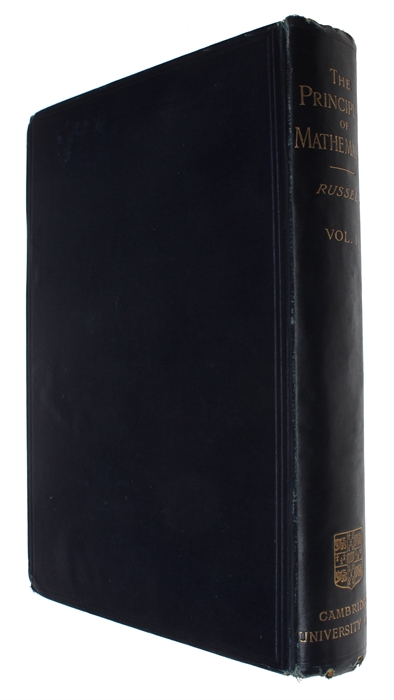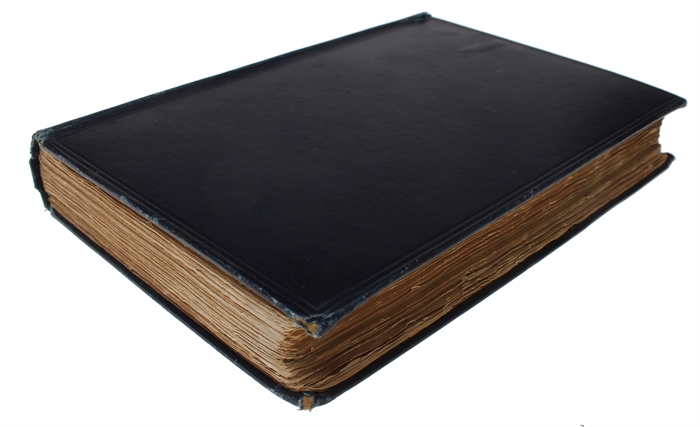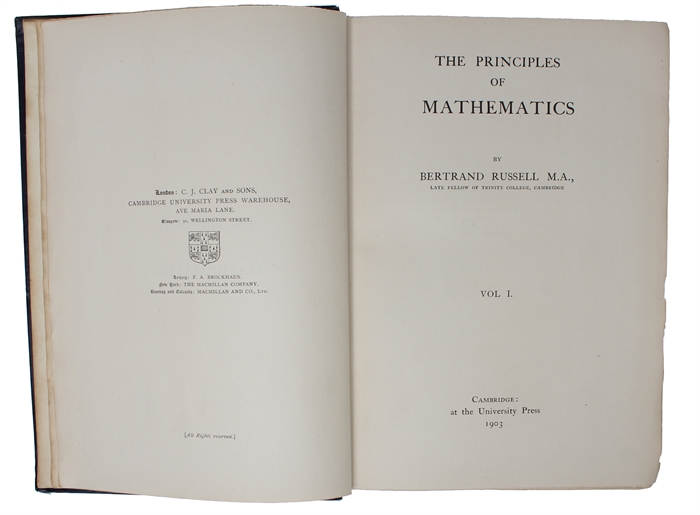"RUSSELL'S PARADOX"
RUSSELL, BERTRAND.
The Principles of Mathematics. Vol I (all).
Cambridge, at the University Press, 1903.
Royal 8vo. Original blue full cloth binding, all edges uncut. Capitals and upper front hinge with a bit of wear and corners a little bumped. But otherwise a very nice copy. Internally fresh and clean. XXIX, (1), 534 pp.
The uncommon first edition of Russell's landmark work in mathematical logic, in which theory of logicism is put forth and in which Russell introduces that which is now known as "Russell's Paradox". The work constitutes the forerunner of Russell and Whitehead's monumental "Principia Mathematica", and it seminally influenced logical thought and theories of the foundations of mathematics at this most crucial time for the development of modern mathematical and philosophical logic.
"The present work has two main objects. One of these, the proof that all pure mathematics deals exclusively with concepts definable in terms of a very small number of fundamental logical concepts, and that its propositions are deducible from a very small number of fundamental logical principles, is undertaken in Parts II. - VI. Of this Volume, and will be established by strict symbolic reasoning in Volume II. ... The other object of the work, which occupies Part I., is the explanation of the fundamental concepts which mathematics accepts as indefinable. ..." (Russell, Preface, p. (III)).
At the age of 27, in 1898, Russell began working on the book that became "The Principles of Mathematics". He originally set out to investigate the contradiction that is inherent in the nature of number, and he originally imagined doing this from a Hegelian standpoint. However, after having read Whitehead's "Universal Algebra", Russell gave up his Hegelian approach and began working on a book that was to be entitled "An Analysis of Mathematical Reasoning". This book never appeared, as he gave it up in 1900, but much of it is what lies at the foundation of "The Principles of Mathematics". After having attended a congress in Paris in 1899, where Peano was present, Russell began rewriting large parts of the work, now with the aim of proving that all of mathematics could be reduced to a few logical concepts, that that which is called mathematics is in reality nothing but later deductions from logical premises. And thus he had developed his landmark thesis that mathematics and logic are identical; a thesis that came to have a profound influence on logic and the foundations of mathematics throughout the 20th century.
Since the congress, Russell had worked with the greatest of enthusiasm, and he finished the manuscript on the 31st of December 1900. However, in the spring of 1901, he discovered "The Contradiction", or as it is now called, "Russell's Paradox". Russell had been studying Cantor's proof, and in his own words, the paradox emerged thus: "Before taking leave of fundamental questions, it is necessary to examine more in detail the singular contradiction, already mentioned, with regard to predicates not predictable of themselves. Before attempting to solve this puzzle, it will be well to make some deductions connected with it, and to state it in various different forms. I may mention that I was led to endeavour to reconcile Cantor's proof that there can be no greatest cardinal number with the very plausible supposition that the class of all termes (which we have seen to be essential to all formal propositions) has necessarily the greatest possible number of members." (p. 101). The class of all classes that are not members of themselves, is this class a member of itself or not? The question was unanswerable (if it is, then it isn't, and if it isn't, then it is) and thus a paradox, and not just any paradox, this was a paradox of the greatest importance. Since, when using classical logic, all sentences are entailed by contradiction, this discovery naturally sparked a huge number of works within logic, set theory, foundations of mathematics, philosophy of mathematics, etc. Russell's own solution to the problem was his "theory of types", also developed in 1903.
In December 1902 Russell had come to the point where he could write a preface, and the book finally appeared in May 1903. It was printed in merely 1.000 copies, and although it was well received, it was not a bestseller at its appearance. By 1909 the last copies of the first run were at the bookbinders. However, the book did play an enormous role in the development of mathematical and philosophical logic as well as the foundation of mathematics throughout the 20th century. Wittgentein's immense interest in the philosophy of logic stems from his reading of the present work and from Frege's "Foundations of Arithmetic", and no logician could neglect the impact of this seminal work, which still counts as one of the most important philosophical and logical works of the 20th century. The book also played an important part in spreading the works of Cantor and Frege to the English-speaking world. In 1903 the Spectator wrote "we should say that Mr. Russell has an inherited place in literature or statesmanship waiting for him if he will condescend to come down to the common day." Shearman's review in Mind hailed it as the most important work since Boole's "Laws of Thought".
"Bertrand Arthur William Russell (b.1872 - d.1970) was a British philosopher, logician, essayist, and social critic, best known for his work in mathematical logic and analytic philosophy. His most influential contributions include his defense of logicism (the view that mathematics is in some important sense reducible to logic), and his theories of definite descriptions and logical atomism. Along with G.E. Moore, Russell is generally recognized as one of the founders of analytic philosophy. Along with Kurt Gödel, he is also regularly credited with being one of the two most important logicians of the twentieth century." (Stanford Encyclopedia of Philosophy).
Russell had actually planned to write a second volume of the work, but as the contents of this further development would overlap considerably with the further research that Whitehead had undertaken after his "Universal Algebra", which he also planned two write a second volume of, the two great logicians decided to collaborate on that which became the "Principia Mathematica", which appeared 1910-13.
Order-nr.: 60086




